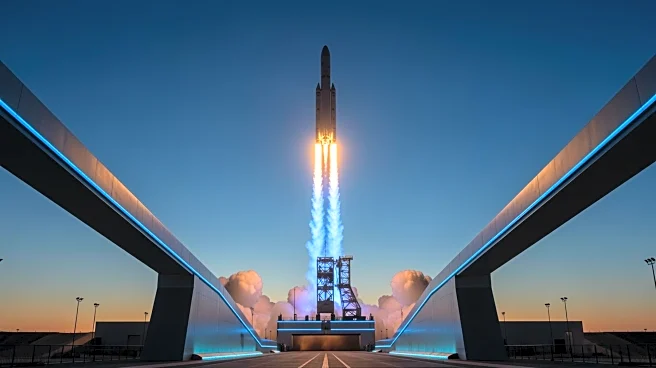What's Happening?
Blue Origin's New Glenn rocket successfully launched on November 13, 2025, carrying NASA's twin ESCAPADE spacecraft to Mars. This marks a significant milestone in reusable rocket technology, positioning
Blue Origin as a competitor to SpaceX in the heavy-lift launch market. The launch followed weather-related delays, including solar storms, but ultimately succeeded in deploying the payloads and achieving a booster landing at sea. New Glenn, named after astronaut John Glenn, is a partially reusable rocket powered by BE-4 and BE-3U engines developed by Blue Origin. The launch demonstrates the rocket's capacity for larger missions and cost-effective space access.
Why It's Important?
The successful launch of New Glenn represents a major advancement in reusable rocket technology, which is crucial for reducing the cost of space exploration and increasing access to space. By achieving a booster landing at sea, Blue Origin demonstrates its capability to compete with SpaceX's Falcon 9 and Starship rockets. This competition could drive innovation and lower costs in the space industry, benefiting government and commercial space endeavors. The launch also supports NASA's ESCAPADE mission, which aims to study Mars' magnetosphere and solar wind interactions, contributing to our understanding of the planet's atmospheric evolution.
What's Next?
Following the successful launch, Blue Origin is expected to continue developing its reusable rocket technology and expand its capabilities for future missions. The company may attract more contracts for satellite deployments, national security payloads, and human spaceflight. As Blue Origin competes with SpaceX, the space industry could see increased innovation and collaboration, leading to more frequent and cost-effective launches. The ESCAPADE mission will proceed with its scientific objectives, providing valuable data on Mars' atmosphere and supporting future exploration efforts.
Beyond the Headlines
The success of New Glenn highlights the growing role of private companies in space exploration, reducing reliance on government funding and accelerating technological advancements. Reusable rockets are key to sustainable space exploration, enabling more frequent missions and reducing environmental impact. Blue Origin's achievements contribute to the vision of a multiplanetary future, where humanity can explore and utilize space resources. As the space industry evolves, collaborations between private companies and government agencies will be essential for advancing scientific discoveries and addressing global challenges.









